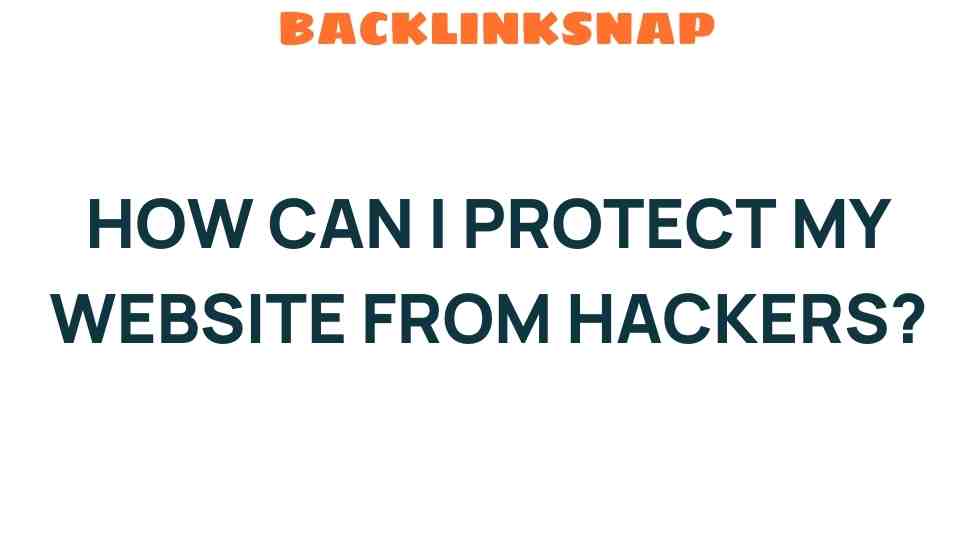Fortifying Your Digital Fortress: How Can I Protect My Website from Hackers?
In today’s digital landscape, ensuring your website security has become more crucial than ever. With the rise of cyber threats targeting businesses and individuals alike, the integrity of your online presence hinges on how well you can protect it. Cybersecurity isn’t just a technical issue; it’s a necessity for maintaining trust with your audience and safeguarding sensitive data. Let’s explore how you can fortify your digital fortress against hackers and ensure robust online protection.
Understanding Cyber Threats
Cyber threats come in various forms, from malware and phishing attacks to Distributed Denial of Service (DDoS) attacks. Each of these risks can compromise your website’s functionality and, more importantly, your data integrity. According to Cybersecurity & Infrastructure Security Agency (CISA), over 30,000 websites are hacked daily. These statistics underline the urgency of adopting stringent measures for hacker prevention.
Website Security: Your First Line of Defense
Website security encompasses a range of practices and technologies designed to protect your site from unauthorized access and data breaches. Here are essential strategies you should implement:
- Secure Hosting: Choose a hosting provider that prioritizes security. Look for features like firewalls, regular backups, and monitoring services. A reputable host will also provide SSL certificates, which are essential for encrypting data transmitted between the server and your users.
- Regular Updates: Keeping your website’s software, plugins, and themes up to date is crucial. Many attacks exploit known vulnerabilities in outdated applications. Schedule regular maintenance to ensure everything is current.
- Strong Passwords: Encourage your team to use strong, unique passwords for all accounts associated with the website. Consider implementing two-factor authentication (2FA) for an added layer of security.
- Firewall Protection: A web application firewall (WAF) can help filter out malicious traffic before it reaches your website. This is an essential component of any comprehensive cybersecurity strategy.
Encryption Methods: Safeguarding Data Integrity
Encryption is another critical element of website security. It transforms readable data into an unreadable format, which can only be reverted back with the appropriate key. Here are a few encryption methods you should consider:
- SSL/TLS Certificates: These certificates are fundamental for encrypting data in transit. They not only secure data but also boost your website’s credibility in the eyes of users and search engines.
- Database Encryption: Encrypt sensitive data stored in your databases. This way, even if a hacker gains access, the data remains protected.
- File Encryption: Use file encryption for sensitive documents and media files stored on your server to further enhance your data protection strategy.
Cybersecurity Tips for Every Business
Implementing the right tools and strategies is vital, but fostering a culture of security awareness among your team is equally important. Here are some effective cybersecurity tips:
- Educate Your Team: Conduct regular training sessions on recognizing phishing attempts and other cyber threats. Empower your employees to play an active role in website security.
- Monitor for Suspicious Activity: Regularly review your website logs for any unusual activity. Early detection can prevent significant damage.
- Create a Response Plan: Prepare for the worst by developing an incident response plan. Knowing how to react can minimize the impact of a security breach.
- Backup Your Data: Regular backups can be a lifesaver in case of a cyberattack. Ensure that backups are stored securely and can be restored quickly.
Investing in Professional Security Services
While implementing these strategies can significantly enhance your website security, consider investing in professional cybersecurity services. Experts can perform security audits, penetration testing, and provide ongoing monitoring to identify and mitigate risks proactively. Services from providers like SecureTech can offer peace of mind and allow you to focus on your core business activities.
Frequently Asked Questions (FAQs)
1. What is website security?
Website security refers to the measures taken to protect a website from cyber threats, unauthorized access, and data breaches. It involves using various technologies and practices to safeguard the integrity of the website and its data.
2. How can I tell if my website has been hacked?
Signs of a hacked website include unexpected changes to your site’s content, unfamiliar user accounts, slower performance, or alerts from your hosting provider about malicious activity.
3. What are some common cyber threats?
Common cyber threats include malware, phishing attacks, DDoS attacks, SQL injection, and cross-site scripting (XSS). Each poses unique risks to your website and data.
4. Why is SSL important for website security?
SSL (Secure Sockets Layer) encrypts data transmitted between the user’s browser and your server, preventing eavesdropping and ensuring data integrity. It also boosts your website’s credibility.
5. How often should I update my website’s software?
Regular updates should be performed as soon as new versions are released, especially for critical software like content management systems and plugins. Aim for a monthly review at the very least.
6. Should I hire a cybersecurity expert?
If your business handles sensitive data or if you lack in-house expertise, hiring a cybersecurity expert is highly recommended. They can provide tailored solutions to your specific security needs.
Conclusion
Protecting your website from hackers is not just a technical necessity but a crucial part of maintaining trust and integrity in today’s digital world. By understanding cyber threats and implementing robust website security measures, you can significantly reduce the risk of attacks. From secure hosting options and encryption methods to fostering a culture of cybersecurity awareness among your team, every step you take fortifies your digital fortress. Remember, in the realm of online protection, vigilance and proactive measures are your best allies.
This article is in the category Digital Marketing and created by BacklinkSnap Team




